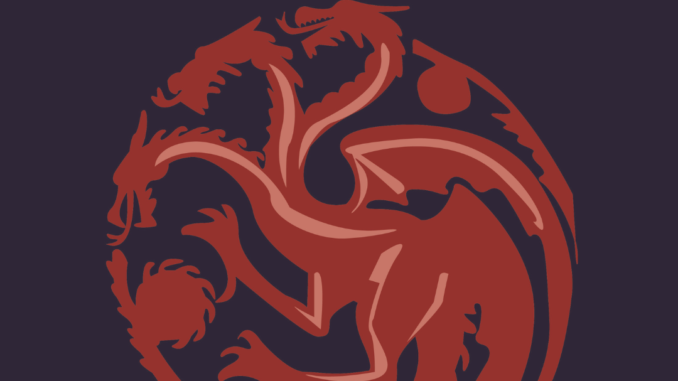
During May 2019, “Game of Thrones,” television staple and flagship series of HBO, came to an end with “The Iron Throne,” the final episode of its eighth season. A bitter end, no doubt, as many longtime fans were quick to regard the series’s final season and finale itself as the worst “Game of Thrones” had to offer. Character arcs betrayed, character development ignored and a seeming urgency on the writers’ part to bring the show to a premature close all number among the many reasons why fans regard the ending as a storytelling failure if not a technical marvel.
Over three years later comes “House of the Dragon,” a prequel series set nearly 200 years before the events of “Game of Thrones.” “House of the Dragon” tells the tumultuous history of House Targaryen, a noble family which once ruled over the Seven Kingdoms of Westeros before its decline and eventual exile to Essos, as seen in “Game of Thrones.” At House Targaryen’s shaky command are 17 dragons, each belonging to a member of the house.
The prologue of “House of the Dragon” recounts the decision of the now-deceased King Jaehaerys Targaryen to make Viserys, his eldest male descendant, the heir, thus denying Rhaenys, his eldest descendant — a woman — the claim to heirdom. This denial sets the stage for the series’s central drama — a struggle between relatives to claim the Iron Throne and a commentary on medieval and, indeed, modern gender roles.
Nine years later, King Viserys eagerly awaits the birth of his son and would-be heir. Introduced are Princess Rhaenyra and Prince Daemon, two other possible heirs should the king be given a daughter with no claim. It is obvious this first episode serves to set the stage for a larger conflict that will no doubt unfold as the series continues, and it would be careless to reveal any further plot points beyond this setting up of the chessboard, so to speak.
It can be said definitively that “House of the Dragon” is good — even great — so far. While the onslaught of medieval language, names and titles is overwhelming, veterans of “Game of Thrones” will have little to no trouble adapting. Author George R.R. Martin’s “Fire and Blood,” the encyclopedia which inspired “House of the Dragon,” is a tome rich in detailed lore and character-driven drama. It is clear the showrunners are passionate fans of Martin and his works. Unlike the rushed nature of the conclusion of “Game of Thrones,” there are no traces of boredom or resignation on the writers’ part.
Where the story might buckle is in its lack of distinctive characters. Many of the characters look physically similar, bear similarly complex names and have the same goal — ascending to the Iron Throne. It’s easy to contrast this aspect with “Game of Thrones” — a series which from the outset introduced a variety of characters differing in upbringing, social class and motive. Despite this, there will surely be branching character arcs and storylines that may diversify as the larger story unfolds. It’s up to the writers not to squander these branches as they did with “Game of Thrones.”
As is expected of such a high-budget production from a network known for such outings, “House of the Dragon” is a technical wonder. King’s Landing, the capital city of Westeros, is breathtaking. From the commanding towers of the Red Keep to the gargantuan domes of the Dragonpit, from the garish halls and corridors of the palace to the decrepit nastiness of the city streets, each locale is well realized and alive with all the brutality expected of Martin’s world and characters.
Like its predecessor, “House of the Dragon” is packed with blood and gore, grotesque injury and petty betrayal at every turn. Not for the fainthearted or weak-stomached, the series continues the precedent set by “Game of Thrones” to portray a brutally realistic story despite that story’s fantastical setting.
Much of this brutality is meted out by the series’s most interesting character to date, Prince Daemon Targaryen. In his claim to the throne, Daemon is willing to tear his way to the top by whatever means necessary. His frightening fervor is well realized by the talented Matt Smith, who portrays the outwardly charming but inwardly calculating Daemon with all the gusto of a veteran actor. Paddy Considine as the aging King Viserys and Rhys Ifans as his shifty advisor Otto Hightower likewise impress. Finally, Emma D’Arcy as Princess Rhaenyra will no doubt blossom into a force to be reckoned with as the series’s central conflict gets underway.
In all, “The Heirs of the Dragon” is as impressive a pilot episode for “House of the Dragon” as the legendary “Winter is Coming” was for “Game of Thrones.” While the idle viewer may feel overwhelmed by the cast of somewhat repetitive characters, there is no doubt the board has been set for a veritable game of chess. 4.5/5
